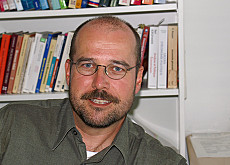Swiss urged not to forget language diversity

Language expert François Grin tells swissinfo that a multilingual Switzerland makes sense from a political, cultural and economic point of view.
His comments come in the wake of a parliamentary debate on the teaching of English – rather than one of Switzerland’s four national languages – as a first foreign language in schools.
Switzerland has four national languages: German is the most widely spoken, followed by French, Italian and then Romansh, an ancient Latin-based language spoken by just 0.5 per cent of the population.
The country has traditionally been proud of its multilingual heritage, with one of the national languages always being taught as the first foreign language in schools.
But lately this has come under threat, as several cantons, particularly in the majority German-speaking region, have opted for English instead.
swissinfo: Is Switzerland still a multilingual country?
François Grin: Switzerland is not any less multilingual than it was before. Although French was always obligatory and the first foreign language for German-speaking pupils, the average person did not always speak it very fluently.
Switzerland is in many ways more multilingual now than it was before, because of migration.
But the language skills of the elite have tailed off. This comes from the fascination for English and the Anglo-Saxon world, which is greater in the German-speaking part than in the French areas. This trend could be countered by raising awareness of the value of multilingualism.
swissinfo: Are people now less prepared to learn another national language?
F.G.: This could be the case, but it is very difficult to sift the truth from the clichés we see in the media.
A concrete example of the strong desire to speak another national language is a Geneva schools survey in which more than 80 per cent of pupils aged 15 said they did not agree with the statement that it was enough to learn one foreign language – English.
Attitudes towards languages are therefore often more complex than you would think.
swissinfo: Is the language balance in the country now out of kilter?
F.G.: In principle the balance of national languages has not been disturbed. But more attention should be paid to Romansh, which is in decline, and to making Italian more visible on a national scale.
But the language situation has changed. It’s important to note that the changes did not happen internally… they came from outside, from international economic ties, the media and the use of English.
Multilingual Switzerland has to deal with these new factors… through having a clear vision of the advantages and disadvantages of being multilingual.
swissinfo: Is globalisation having an effect on the balance of languages?
F.G.: Although giving priority to national languages is part of the Swiss identity, we have to realise that there are more than four languages in use in our country.
It is also wrong to think of English being the language of globalisation… multilingualism is a key factor in globalisation. Therefore it is not globalisation itself that disturbs the language balance but the associated, increasing dominance of a single language – English.
swissinfo: Why are some language areas more resistant to English than others?
F.G.: In France, keeping the native language intact has always been important, more so than in Germany. But it’s debatable whether French has resisted any better because of this.
There are differences within Switzerland as well. The French-speakers resist more than the German-speakers, but in general have a more defiant stance towards power.
But even in the German-speaking part, English is no longer seen as being so “cool”. We could be approaching a turning point with multilingualism being taken for granted. This would lead to the domination of English being somewhat limited.
swissinfo, based on an interview in German by Alexander Künzle
National languages:
German (63.7% of the population)
French (20.4%)
Italian (6.5%)
Romansh (0.5%).
Nine per cent of the population say their main language is not one of these four.
One of Grin’s areas of expertise is the economics of language – how multilingualism can best be tackled in a globalised world.
He studied at Geneva University and has done research in Washington and Montreal.
From 1998 to 2001 he served as deputy director of the European Centre for Minority Issues (ECMI) in Flensburg, Germany.
He currently shares his time between the Education Research Unit of the Geneva authorities and the newly created chair in economics at the Institute of Translation and Interpretation at Geneva University.

In compliance with the JTI standards
More: SWI swissinfo.ch certified by the Journalism Trust Initiative










You can find an overview of ongoing debates with our journalists here . Please join us!
If you want to start a conversation about a topic raised in this article or want to report factual errors, email us at english@swissinfo.ch.